- Home
- Joanne Harris
Five Quarters of the Orange: A Novel Page 5
Five Quarters of the Orange: A Novel Read online
Page 5
The Standing Stones were the remains of an old jetty, long since swept away by the currents. Five stone pillars, one shorter than the rest, protruding from the water. A metal staple stuck out from the side of each, bleeding tears of rust into the rotten stone, where boards had once been fixed. It was on these metal protrusions that we hung our trophies; barbaric garlands of fish heads and flowers, signs lettered in secret codes, magical stones, driftwood sculptures. The last pillar stood well into the deep water at a point where the current was especially strong, and it was here we hid our treasure chest. This was a tin box wrapped in oilcloth and weighted with a piece of chain. The chain was secured to a rope, which in its turn was tied to the pillar we all referred to as the Treasure Stone. To retrieve the treasure it was necessary first to swim to the last pillar—no mean feat—then, holding on to the pillar with one arm, to haul up the sunken chest, detach it and swim with it back to the shore. It was accepted that only Cassis could do this. The “treasure” consisted mainly of things no adult would recognize as being of value. The potato guns. Chewing gum, wrapped in greased paper to make it last. A stick of barley sugar. Three cigarettes. Some coins in a battered purse. Actresses’ photographs (these, like the cigarettes, belonged to Cassis). A few issues of an illustrated magazine specializing in lurid stories.
Sometimes Paul Hourias came with us on what Cassis called our “hunting trips,” though he was never fully initiated into our secrets. I liked Paul. His father, Jean-Marc, sold bait on the Angers road and his mother took in mending to make ends meet. He was an only child of parents old enough to be his grandparents, and much of his time was spent keeping out of their way. He lived as I longed to live; in summer he spent whole nights out in the woods without arousing any concern from his family. He knew where to find mushrooms on the forest floor and to make whistles out of willow twigs. His hands were deft and clever, but he was often awkward and slow in speech, and when adults were near he stuttered. Though he was close to Cassis’s age, he did not go to school, but helped instead on his uncle’s farm, milking the cows and bringing them to and from the pasture. He was patient with me too, more so than Cassis, never making fun of my ignorance or scorning me because I was small. Of course, he’s old now. But I sometimes think that of the four of us, he is the one who has aged the least.
part two
Forbidden Fruit
1.
It was already, in early June, promising to be a hot summer and the Loire was low and surly with quicksand and landslides. There were snakes too, more than usual, flat-headed brown adders that lurked in the cool mud in the shallows. Jeannette Gaudin was bitten by one of these as she paddled one dry afternoon, and they buried her a week later in Saint-Benedict’s churchyard, beneath a little plaster cross and an angel. Beloved Daughter…1934–1942. I was a year older than she was.
Suddenly I felt as if a gulf had opened beneath me, a hot, deep hole like a giant mouth. If Jeannette could die, then so could I. So could anyone. Cassis looked down from the height of his fourteen years in some scorn: “You expect people to die in wartime, stupid. Children too. People die all the time.”
I tried to explain and found that I could not. Soldiers dying—even my own father—that was one thing. Even civilians killed in bombing, though there had been little enough of that in Les Laveuses. But this was different. My nightmares worsened. I spent hours watching the river with my fishing net, catching the evil brown snakes in the shallows, smashing their flat clever heads with a stone and nailing their bodies to the exposed roots at the riverbank. A week of this and there were twenty or more drooping lankly from the roots, and the stink—fishy and oddly sweet, like something bad fermented—was overwhelming. Cassis and Reinette were still at school—they both went to the collège in Angers—and it was Paul who found me with a clothespin on my nose to keep out the stench, doggedly stirring the muddy soup of the verge with my net.
He was wearing shorts and sandals, and held his dog, Malabar, on a leash made of string.
I gave him a look of indifference and turned back to the water. Paul sat down next to me. Malabar flopped onto the path, panting. I ignored them both. At last Paul spoke. “Wh-what’s wrong?”
I shrugged. “Nothing. I’m just fishing, that’s all.”
Another silence. “For s-snakes.” His voice was carefully uninflected.
I nodded, rather defiantly. “So?”
“So nothing.” He patted Malabar’s head. “You can do what you like.” A pause that crawled between us like a racing snail.
“I wonder if it hurts,” I said at last.
He considered it for a moment as if he knew what I meant, then shook his head. “Dunno.”
“They say the poison gets into your blood and makes you go numb. Just like going to sleep.”
He watched me noncommittally, neither agreeing nor disagreeing. “C-Cassis sez that Jeannette Gaudin musta seen Old Mother,” he said at last. “You know. That’s why the snake b-bit her. Old Mother’s curse.”
I shook my head. Cassis, the avid storyteller and reader of lurid adventure magazines (with titles like The Mummy’s Curse or Barbarian Swarm), was always saying things like that.
“I don’t think Old Mother even exists,” I said defiantly. “I’ve never seen her, anyway. Besides, there’s no such thing as a curse. Everyone knows that.”
Paul looked at me with sad, indignant eyes. “Course there is,” he said. “And she’s down there all right. M-my dad saw her once, way back before I was born. B-biggest pike you ever saw. Week later, he broke his leg falling off of his b-bike. Even your dad got—” He broke off, dropping his eyes in sudden confusion.
“Not my dad,” I said sharply. “My dad was killed in battle.” I had a sudden, vivid picture of him marching, a single link in an endless line that moved relentlessly toward a gaping horizon.
Paul shook his head. “She’s there,” he said stubbornly. “Right at the deepest point of the Loire. Might be forty years old, maybe fifty. Pikes live a long time, the old uns. She’s black as the mud she lives in. And she’s clever, crazy-clever. She’d take a bird sitting on the water as easy as she’d gulp a piece of bread. My dad sez she’s not a pike at all but a ghost, a murderess, damned to watch the living forever. That’s why she hates us.”
This was a long speech for Paul, and in spite of myself I listened with interest. The river abounded with stories and old wives’ tales, but the story of Old Mother was the most enduring. The giant pike, her lip pierced and bristling with the hooks of anglers who had tried to catch her. In her eye, an evil intelligence. In her belly, a treasure of unknown origin and inestimable worth.
“My dad sez that if anyone was to catch her, she’d hafta give you a wish,” said Paul. “Sez he’d settle for a million francs and a look at that Greta Garbo’s underwear.” He grinned sheepishly. That’s grownups for you, his smile seemed to say.
I considered this. I told myself I didn’t believe in curses or wishes for free. But the image of the old pike wouldn’t let go.
“If she’s there, we could catch her,” I told him abruptly. “It’s our river. We could.”
It was suddenly clear to me; not only possible, but an obligation. I thought of the dreams that had plagued me ever since Father died; dreams of drowning, of rolling blind in the black surf of the swollen Loire with the clammy feel of dead flesh all around me, of screaming and feeling my scream forced back into my throat, of drowning in myself. Somehow the pike personified all that, and though my thinking was certainly not as analytical as that, something in me was suddenly certain—certain—that if I were to catch Old Mother, something might happen. What it might be I would not articulate even to myself. But something, I thought in mounting, incomprehensible excitement. Something.
Paul looked at me in bewilderment. “Catch her?” he repeated. “What for?”
“It’s our river,” I said stubbornly. “It shouldn’t be in our river.” What I wanted to say was that the pike offended me in some secret, visceral way, much mo
re so than the snakes: its slyness, its age, its evil complacency. But I could think of no way to say it. It was a monster.
“’Sides, you’d never do it,” Paul went on. “I mean, people have tried. Grownup people. With lines and nets an’ all. It bites through the nets. And the lines…it breaks them right snap down the middle. It’s strong, see. Stronger than either of us.”
“Doesn’t have to be,” I insisted. “We could trap it.”
“You’d hafta be bloody clever to trap Old Mother,” said Paul stolidly.
“So?” I was beginning to be angry now, and I faced him with fists and face both clenched in frustration. “So we’ll be clever. Cassis and me and Reinette and you. All four of us. Unless you’re scared.”
“I’m not s-scared, but it’s im-im-impossible.” He was stuttering again, as he always did when he felt under pressure.
I looked at him. “Well, I’ll do it on my own if you won’t help. And I’ll catch the old pike too. You just wait.” For some reason my eyes were stinging. I wiped them furtively with the heel of my hand. I could see Paul watching me with a curious expression, but he said nothing. Viciously, I poked at the hot shallows with my net. “’S only an old fish,” I said. Poke. “I’ll get it and I’ll hang it on the Standing Stones.” Poke. “Right there.” I pointed at the Treasure Stone with my dripping net. “Right there,” I said again in a low voice, spitting on the ground to prove that what I said was true.
2.
My mother smelt oranges all through that hot month. As often as once a week, though it was not every time that a bad spell ensued. While Cassis and Reinette were at school I ran to the river, mostly on my own but sometimes accompanied by Paul, when he could get away from his chores on the farm.
I had reached an awkward age, and separated from my siblings for most of those long days I grew bold and defiant, running away when my mother gave me work to do, missing meals and coming home late and dirty, my clothes streaked yellow with riverbank dust, hair untied and plastered back with sweat. I must have been born confrontational, but that summer I grew more so than I had ever been. My mother and I stalked each other like cats staking out their territory. Every touch was a spark that hissed with static. Every word was a potential insult, every conversation a minefield. At mealtimes we sat face-to-face, glowering over our soup and pancakes. Cassis and Reine flanked us like frightened courtiers, big-eyed and silent.
I don’t know why we pitted ourselves against each other; maybe it was the simple fact that I was growing up. The woman who had terrified me during my infancy now took on a different light. I could see the gray in her hair, the lines bracketing her mouth. I could see now—with a flash of contempt—that she was only an aging woman whose bad spells sent her helpless to her room.
And she baited me. Deliberately—or so I thought. Now I think that maybe she couldn’t help it, that it was as much in her unhappy nature to bait me as it was in mine to defy her. It seemed during that summer that every time she opened her mouth it was to criticize. My manners, my dress, my appearance, my opinions. Everything, according to her, was reprehensible. I was slovenly: I left my clothes unfolded at the foot of my bed when I went to sleep. I slouched when I walked: I would become a hunchback if I wasn’t careful. I was greedy, stuffing myself with fruit from the orchard. Otherwise I had little appetite: I was growing thin, scrawny. Why couldn’t I be more like Reine-Claude? At twelve, my sister had already ripened. Soft and sweet as dark honey, with amber eyes and autumn hair, she was every storybook heroine, every screen goddess I had ever imagined and admired. When we were younger she would let me plait her hair, and I would twist flowers and berries into the thick strands and circle her head with convolvulus so that she looked like a woodland sprite. Now there was something almost adult about her composure, her passive sweetness. Next to her I looked like a frog, my mother told me, an ugly skinny little frog with my wide sullen mouth and my big hands and feet.
I remember one of those dinnertime conflicts in particular. I remember we had paupiettes, those little parcels of veal and minced pork tied with string and cooked in a thick stew of carrots, shallots, tomatoes in white wine. I looked into my plate with sullen disinterest. Reinette and Cassis looked at nothing, carefully detached.
My mother clenched her fists, infuriated by my silence. After my father’s death there was no one to temper her rage, and it was always close by, boiling under the surface. She seldom struck us—very unusual in those days, almost a freak—though it was not, I suspect, from any great sense of affection. Rather, she was afraid that, having begun, she might not be able to stop.
“Don’t slouch, for God’s sake.” Her voice was tart as an unripe gooseberry. “You know that if you slouch, you’ll end up staying that way.”
I gave her a quick, insolent look and put my elbows on the table.
“Elbows off the table!” she almost moaned. “Look at your sister. Look at her. Does she slouch? Does she behave like a sulky farmhand?”
It did not occur to me to resent Reinette. It was my mother I resented, and I showed it with every movement of my sly young body. I gave her every excuse to hound me. She wanted the clothes on the washing line hung by the hems: I hung them by the collars. The jars in the pantry had to have the labels facing the front: I turned them backward. I forgot to wash my hands before meals. I changed the order of the pans hanging on the kitchen wall, largest to smallest. I left the kitchen window open so that when she opened the door the draft would make it bang. I infringed a thousand of her personal rules, and she reacted to each trespass with the same bewildered rage. To her, those petty rules mattered because those were the things she used to control our world. Take them away and she was like the rest of us, orphaned and lost.
Of course, I didn’t know that then.
“You’re a hard little bitch, aren’t you?” she said at last, pushing away her plate. “Hard as nails.” There was neither hostility nor affection in her voice, merely a kind of cool disinterest. “I used to be like that,” she said. It was the first time I had ever heard her speak of her own childhood. “At your age.” Her smile was stretched and mirthless. Impossible to imagine her ever being young. I stabbed at my paupiette in its congealing sauce.
“I always wanted to fight everybody too,” said my mother. “I would have sacrificed everything, hurt anyone to prove myself right. To win.” She looked at me intently, curiously, her black eyes like pinpricks in tar. “Contrary, that’s what you are. I knew from the moment you were born that’s what you were going to be. You started it all again, worse than ever. The way you screamed in the night and wouldn’t feed—and me lying awake with the doors closed and my head pounding.”
I did not answer. After a moment my mother laughed rather jeeringly and began to clear the dishes. It was the last time she spoke of the war between us, though that war was far from over.
3.
The Lookout Post was a large elm on the near bank of the Loire. Half overhanging the water, a clutch of thick roots hanging down deep from the dry soil of the bank, it was easy to climb even for me, and from the higher branches I could see all of Les Laveuses. Cassis and Paul had built a primitive tree house there—a platform and some branches bent over to make a roof—but I was the one who spent the most time in the completed shelter. Reinette was reluctant to climb to the top, though the way had been made easier by means of a knotted rope, and Cassis rarely went there any more, so I often had the place to myself. I went there to think and to watch the road, where sometimes I could see the Germans in their jeeps—or more often, motorcycles—passing by.
Of course, there was little to interest the Germans in Les Laveuses. There were no barracks, no school, no public buildings for them to occupy. They settled in Angers instead, with only a few patrols around the neighboring villages, and all I saw of them—except for the vehicles on the road—were the groups of soldiers sent every week to requisition produce from the Hourias farm. Our own was less frequented: we had no cows, only a few pigs and goats. Our main
source of income was fruit, and the season had barely begun. A couple of soldiers came, halfheartedly, once a month, but the best of our supplies were well hidden, and Mother always sent me out into the orchard when the soldiers came. Even so I was curious about the gray uniforms, sometimes sitting in the Lookout Post and shooting imaginary rockets at the jeeps as they sped by. I was not truly hostile—none of the children were. We were merely curious, repeating the insults our parents taught us—filthy Boche, Nazi swine—out of an instinct for mimicry. I had no idea of what was happening in Occupied France; little enough notion of where Berlin even was.
Once they had come to requisition a violin from Denis Gaudin, Jeannette’s grandfather. Jeannette told me about it just a week before she died. It was getting dark and the blackout shutters were already in place, when she heard a knocking at the door. She opened it and saw a German officer. In polite though laborious French he addressed her grandfather.
“Monsieur, I…understand…you have…a violin. I…need it.”
A few of the officers, it seemed, had decided to form a military band. I suppose even Germans needed some way of passing the time.
Old Denis Gaudin looked at him. “A violin, mein Herr, is like a woman,” he replied pleasantly. “Not to be lent out.” And very gently he closed the door. There was a silence as the officer digested this. Jeannette looked up at her grandfather with wide eyes. Then, outside, the sound of the German officer laughing and repeating:
“Wie eine Frau! Wie eine Frau!”
The German officer never came back, and Denis kept his violin until much later, almost until the end of the war.
4.
For a time that summer, however, my main interest was not the Germans. I spent most of my waking hours—and many of my sleeping—devising ways of trapping Old Mother. I studied the various techniques of fishing. Line for eels, pots for crays, dragnets, straight nets, live bait and skim lures. I went to Jean-Marc Hourias and plagued him until he had told me all he knew about bait. I dug bloodworms from the sides of the banks and learned to keep them in my mouth for warmth. I trapped bluebottles and threaded them on lines bristling with fishhooks like strange tinsel. I made traps from cages of willow and thread, baited with scraps. A single touch on one of the threads in the cage and it would spring shut, jerking the whole contraption out of the water as the bent branch underneath it was released. I stretched pieces of net across the narrower channels between the sandbanks. I left static lines baited with boluses of rotting meat hanging from the far bank. In this way I caught any number of perch, small bleaks, gudgeons, minnows and eels. Some I took home to eat and watched my mother prepare them. The kitchen was the now only neutral place in the house, a place of brief respite from our private war. I used to stand beside her, listening to her low monotone, and together we made her bouillabaisse angevine, the fish stew with red onions and thyme, and perch roasted in tinfoil with tarragon and wild mushrooms. Some of my catches I left at the Standing Stones in gaudy, stinking garlands: a warning and a challenge.

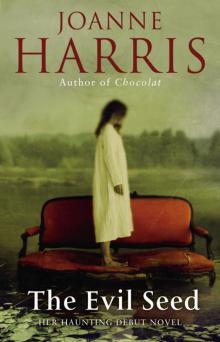 The Evil Seed
The Evil Seed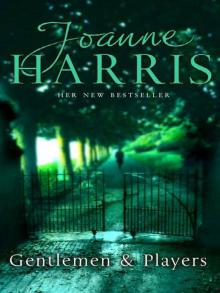 Gentlemen and Players
Gentlemen and Players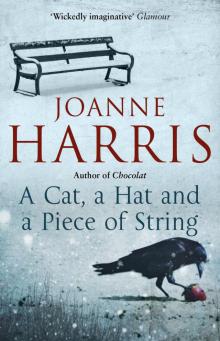 A Cat, a Hat, and a Piece of String
A Cat, a Hat, and a Piece of String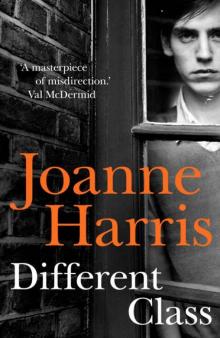 Different Class
Different Class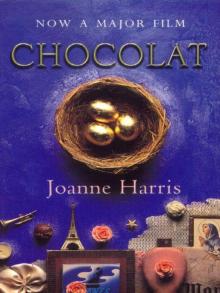 Chocolat
Chocolat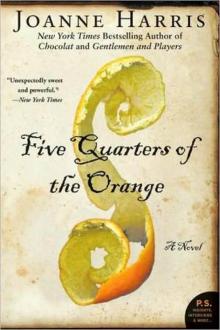 Five Quarters of the Orange: A Novel
Five Quarters of the Orange: A Novel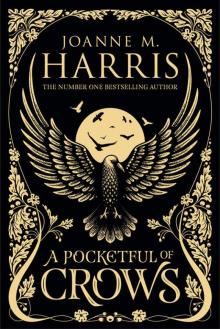 A Pocketful of Crows
A Pocketful of Crows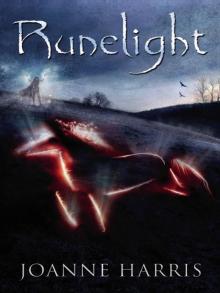 Runelight
Runelight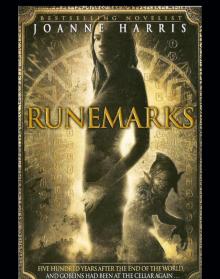 Runemarks
Runemarks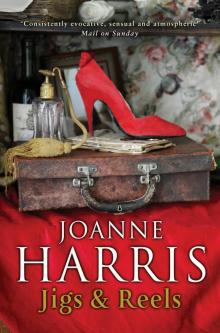 Jigs & Reels: Stories
Jigs & Reels: Stories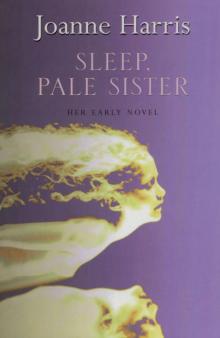 Sleep, Pale Sister
Sleep, Pale Sister Holy Fools
Holy Fools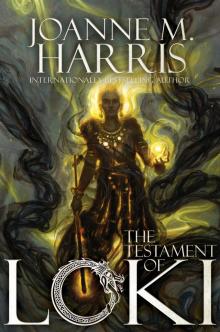 The Testament of Loki
The Testament of Loki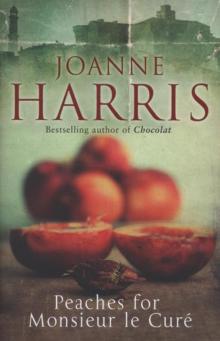 Peaches for Monsieur Le Curé
Peaches for Monsieur Le Curé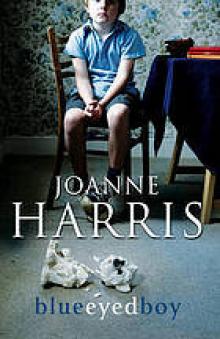 Blueeyedboy
Blueeyedboy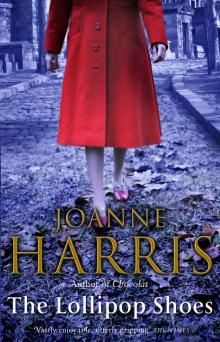 The Lollipop Shoes
The Lollipop Shoes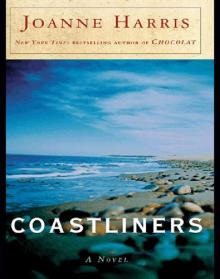 Coastliners
Coastliners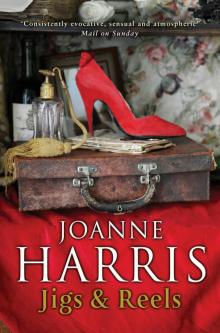 Jigs & Reels
Jigs & Reels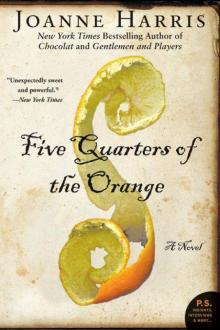 Five Quarters of the Orange
Five Quarters of the Orange